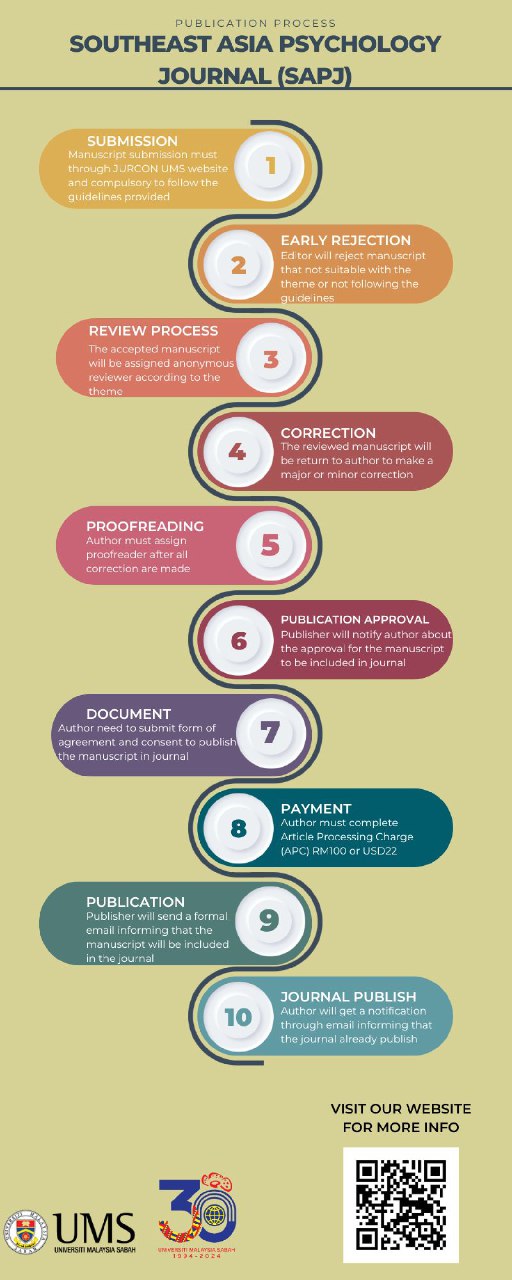THE RELATIONSHIP OF GRIT TRAITS ON STRESS LEVEL AND ACADEMIC ACHIEVEMENT AMONG UNIVERSITY MALAYSIA SABAH (UMS) STUDENTS
DOI:
https://doi.org/10.51200/sapj.v9i2.5096Keywords:
Stress Level, Academic Achievement, Grit TraitsAbstract
Traditionally, academic achievement and success is often measured by cognitive abilities such as aptitude and intelligence. However, the grit concept has received attention from researchers as the predictor for academic achievement. Dimensions of grit which are Perseverance of Effort (PE) and Consistency of Interest (CI) plays a different role in an individual. Hence, this quantitative study is conducted to examine the relationship of grit traits on academic achievement and stress level among University Malaysia Sabah (UMS) students. In addition, it also examines the differences of dimensions of grit between gender and differences of grit on students’ academic achievement. The study sample consisted of 220 UMS students and was conducted using two instruments, 12-item Grit Scale (Grit-O) and Depression, Anxiety, Stress Scale (DASS-21). Result findings showed no significant relationship of dimensions of grit on academic achievement. Whereas, there is a variety of finding for the relationship of dimensions of grit on stress level. However, only CI is influenced by stress level, while PE does not have any influence. The differences towards dimensions of grit and gender and grit on students’ academic achievement also showed no significant difference which explains that students based on gender and academic achievement categories have the same level of grit. Hence, the overall findings of this study contribute to the increased understanding of the complexities related to the relationship of grit on academic achievement and stress level. Additional limitations and implications are presented along with offerings for further research recommendations.
References
Bazelais, P., Lemay, D. J., & Doleck, T. (2016). How does grit impact college students’ academic achievement in science? European Journal of Science and Mathematics Education, 4(1), 33–43.
Bowman, N. A., Hill, P. L., Denson, N., & Bronkema, R. (2015). Keep on truckin’or stay the course? Exploring grit dimensions as differential predictors of educational achievement, satisfaction, and intentions. Social Psychological and Personality Science, 6(6), 639-645.
Bridgeman, B., McCamley-Jenkins, L., & Ervin, N. (2000). Predictions of freshman grade-point average from the revised and recentered SAT I: Reasoning test. College Entrance Examination Board.
Chang, W. (2014). Grit and academic performance: Is being grittier better? (Unpublished doctoral dissertation). University of Miami, Florida.
Crede, M., Tynan, M. C., & Harms, P. D. (2017). Much ado about grit: A meta-analytic synthesis of grit literature. Journal of Personality and Social Psychology, 113(3), 492– 511. https://doi.org/10.1037/pspp0000102.
Datu, J. A. D., King, R. B., Valdez, J. P. M., & Eala, M. S. M. (2018). Grit is Associated with Lower Depression via Meaning in Life among Filipino High School Students. Youth & Society,0044118X1876040. doi:10.1177/0044118x18760402
Duckworth, A. L., & Quinn, P. D. (2009). Development and validation of the Short Grit Scale (GRIT–S). Journal of Personality Assessment, 91(2),166–174. https://doi.org/10.1080/00223890802634290
Duckworth, A. L., Peterson, C., Matthews, M. D., & Kelly, D. R. (2007). Grit: Perseverance and passion for long-term goals. Journal of Personality and Social Psychology, 92(6), 1087–1101. https://doi.org/10.1037/0022-3514.92.6.1087
Dweck, C. S. (2013). Self-theories: Their role in motivation, personality, and development. Psychology press.
Farrer, L. M., Gulliver, A., Bennett, K., Fassnacht, D. B., & Griffiths, K. M. (2016). Demographic and psychosocial predictors of major depression and generalised anxiety disorder in Australian university students. BMC psychiatry, 16(1), 1-9.
Hwang, M. H., Lim, H. J., & Ha, H. S. (2017). Effects of Grit on the Academic Success of Adult Female Students at Korean Open University. Psychological Reports, 121(4), 705–725. doi:10.1177/0033294117734834
Ion, A., Mindu, A., & Gorbănescu, A. (2017). Grit in the workplace: Hype or ripe? Personality and Individual Differences,111,163-168. https://doi.org/10.1016/j.paid.2017.02.012
Ivcevic, Z., & Brackett, M. (2014). Predicting school success: Comparing conscientiousness, grit, and emotion regulation ability. Journal of research in personality, 52, 29-36.
Jensen, A. R. (1998). Human evolution, behavior, and intelligence.The g factor: The science of mental ability. Praeger Publishers/Greenwood Publishing Group.
Krejcie, R. V., & Morgan, D. W. (1970). Determining Sample Size for Research Activities. Educational and Psychological Measurement, 30(3), 607–610. https://doi.org/10.1177/001316447003000308
Larson, E. A. (2006). Stress in the lives of college women: Lots to do and not much time”. Journal of Adolescent Research, 21(6), 579-606.
Lee, W. W. S. (2017). Relationships among grit, academic performance, perceived academic failure, and stress in associate degree students. Journal of Adolescence, 60, 148–152. doi:10.1016/j.adolescence.2017.08.006
Leung, D. Y., Lam, T., & Chan, S. S. (2010). Three versions of Perceived Stress Scale: validation in a sample of Chinese cardiac patients who smoke. BMC Public Health, 10(1). https://doi.org/10.1186/1471-2458-10-513
Lovibond SH, Lovibond PF: Manual for the Depression Anxiety Stress Scales. Sydney Psychology Foundation Australia 1995.
Moutafi, J., Furnham, A., and Paltiel, L. (2005). Why is conscientiousness negatively correlated with intelligence? Personality and Individual Differences, 37(5), 1013-1022. doi: 10.1016/j.paid.2003.11.010
Muenks, K., Wigfield, A., Yang, J. S., & O’Neal, C. R. (2017). How true is grit? Assessing its relations to high school and college students’ personality characteristics, self-regulation, engagement, and achievement. J Educ Psychol, 109(5), 599–620. https://doi.org/10.1037/edu0000153.
Panigrahi, M.R., (2005). Academic Achievement in relation to Intelligence and Socio-Economic Status of High School Students, Edu Tracks, volume 5, No. 2, Hyderabad, SriSuresh Chandra Sharma, Neelkamal Publication Pvt ltd.
Pate, A. N., Payakachat, N., Harrell, T. K., Pate, K. A., Caldwell, D. J., & Franks, A.M. (2017). Measurement of grit and correlation to student pharmacist academic performance. American journal of pharmaceutical education, 81(6).
Pedersen, D. E., & Jodin, V. (2016). Stressors associated with the school spillover of college undergraduates. The Social Science Journal, 53, 40-48
Pulkkinen, E. A., & de la Ossa, P. P. (2020). Grit and chiropractic students’ academic performance: a cross-sectional study. Journal of Chiropractic Education, 35(1), 124–130. https://doi.org/10.7899/jce-19-8
Schmidt, F. L., & Hunter, J. (2004). General Mental Ability in the World of Work: Occupational Attainment and Job Performance. Journal of Personality and Social Psychology, 86(1), 162–173. https://doi.org/10.1037/0022-3514.86.1.162
Schreiner, L. A. (2017). The privilege of grit. About Campus: Enriching the Student Learning Experience, 22(5), 11-20.
Sharkey, C. M., Bakula, D. M., Gamwell, K. L., Mullins, A. J., Chaney, J. M., & Mullins, L. L. (2017). The role of grit in college student health care management skills and health-related quality of life. Journal of pediatric psychology, 42(9), 952-961
Tang, X., Wang, M. T., Parada, F., & Salmela-Aro, K. (2021). Putting the Goal Back into Grit: Academic Goal Commitment, Grit, and Academic Achievement. Journal of Youth and Adolescence, 50(3), 470–484. https://doi.org/10.1007/ s10964-020-01348-1
Wibrowski, C. R., Matthews, W. K., & Kitsantas, A. (2017). The role of a skills learning support program on first-generation college students’ self-regulation, motivation, and academic achievement: A longitudinal study. Journal of College Student Retention: Research, Theory & Practice, 19(3), 317-332.
Wolters, C. A., & Hussain, M. (2015). Investigating grit and its relations with college students’ self-regulated learning and academic achievement. Metacognition and Learning, 10(3), 293–311. https://doi.org/10.1007/s11409-014-9128-9
Yoon, S., Kim, S., & Kang, M. (2018). Predictive power of grit, professor support for autonomy and learning engagement on perceived achievement within the context of a flipped classroom. Active Learning in Higher Education, 146978741876246. doi:10.1177/1469787418762463
Zhang, M. X., Mou, N. L., Tong, K. K., & Wu, A. (2018). Investigation of the effects of purpose in life, grit, gratitude, and school belonging on mental distress among Chinese emerging adults. International journal of environmental research and public health, 15(10), 2147.








